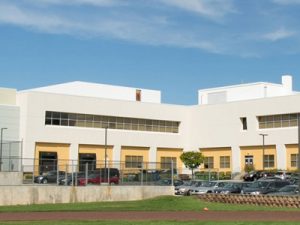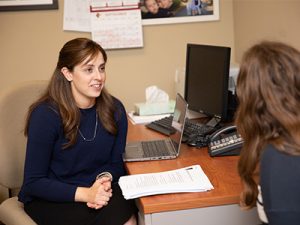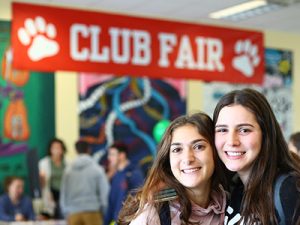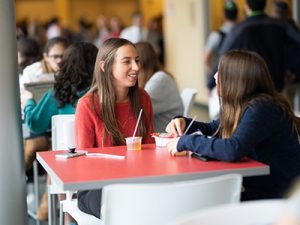Frisch Engineering Team Wins First Place at CIJE Innovation Day
May 10, 2018
 Yeshivat Frisch won First Place in the Center for Initiatives in Jewish Education’s (CIJE) Innovation Day this past Sunday, May 6 at the NYC Hilton, with two individual Frisch sophomore teams also taking home the first and second place prizes for the 2018 Rambam Innovation Award.
Yeshivat Frisch won First Place in the Center for Initiatives in Jewish Education’s (CIJE) Innovation Day this past Sunday, May 6 at the NYC Hilton, with two individual Frisch sophomore teams also taking home the first and second place prizes for the 2018 Rambam Innovation Award.
This year’s CIJE-Tech Innovation Day featured some 400 engineering capstone projects of 1300 students from 32 different yeshiva day schools, the culmination of the CIJE-Tech High School Program. The Rambam Innovation Award, a joint initiative of CIJE and American Friends of Rambam Medical Center, was judged by a panel of engineers from Haifa’s Rambam Medical Center – a leader in the field of emergency response. The competition challenged students to create a project that would “correlate to Rambam’s work in preparation and response to disasters, whether natural or man-made, as well as mass casualty situations.”
 Frisch’s first-place submission, “Illuminate + Evacuate” (by Zachary Gold, Manny Nagel and Caroline Waxman) engineered an escape route system that could be used in the evacuation of large buildings. The system locates the exact location of a fire, develops the safest route out of the building and illuminates that exit path via LED lighting. The system detects whether any would-be nearest exits are blocked or adjacent to a fire, eliminating the risk that an individual could encounter a dangerous dead end.
Frisch’s first-place submission, “Illuminate + Evacuate” (by Zachary Gold, Manny Nagel and Caroline Waxman) engineered an escape route system that could be used in the evacuation of large buildings. The system locates the exact location of a fire, develops the safest route out of the building and illuminates that exit path via LED lighting. The system detects whether any would-be nearest exits are blocked or adjacent to a fire, eliminating the risk that an individual could encounter a dangerous dead end.
Frisch’s second-place submission, “The Key to Safety” (by Shifra Dimbert, Rachel Gelb and Ayelet Glaser), coded an automatic attendance recording system that uses chip technology on student ID cards to record the location of every student within a school building. The system is designed to reduce chaos in cases of a school shooting or other disasters, when first responders usually don’t know which students are accounted for, or where they are. In the “ Key to Safety” system, students not only swipe their cards upon entering school building, they also swipe their cards upon entry to each classroom over the course of the day. These locations are then inputted into an app, which can be referenced by police and/or faculty in case of an emergency.
 Coding both systems presented tricky engineering challenges. Glaser noted that her team’s code for “The Key to Safety” had never been done before, with Dimbert adding that people have used different sensors alone, rather than in conjunction with each other). Gelb said it was particularly difficult to figure out how to recognize every different student card. Their teacher and mentor, Frisch Engineering Program Director Mrs. Rifkie Silverman guided them as they researched related codes and explained new knowledge by way of concepts they already knew.
Coding both systems presented tricky engineering challenges. Glaser noted that her team’s code for “The Key to Safety” had never been done before, with Dimbert adding that people have used different sensors alone, rather than in conjunction with each other). Gelb said it was particularly difficult to figure out how to recognize every different student card. Their teacher and mentor, Frisch Engineering Program Director Mrs. Rifkie Silverman guided them as they researched related codes and explained new knowledge by way of concepts they already knew.
“Illuminate + Evacuate” also encountered challenges along the way. “The way that LED strips work, it’s not meant to be coded in multiple groups, and we needed 21 different groups,” said Nagel. “We spent a lot of time building the model, and when we plugged it in and saw it actually work, that was very rewarding.”
Aside from the Rambam entries, the Frisch Engineering Team brought numerous projects to CIJE that have the potential to improve the lives of people around the world. For example, sophomore Evan Haimm’s group developed a color sensor that would be able to read medical and legal documents out loud for the blind. “Braille printers use complex technology and cost thousands of dollars,” said Haimm. “What we wanted to do is offer a printable and cheaper alternative.”
 Meanwhile, sophomore Jonathan Sarasohn’s group created a communicator that enables people who are audibly and visually impaired to communicate with able-bodied individuals. The most rewarding part of the project? “Knowing that it had the potential to impact people’s lives,” said Sarasohn.
Meanwhile, sophomore Jonathan Sarasohn’s group created a communicator that enables people who are audibly and visually impaired to communicate with able-bodied individuals. The most rewarding part of the project? “Knowing that it had the potential to impact people’s lives,” said Sarasohn.
 Frisch’s Engineering Track is one of the school’s three specialty tracks, in addition to Arts/Music and Foreign Languages. It aims to help students develop skills in the areas of inquiry, critical thinking, problem seeking, problem solving, research and presentation. Students who choose the Engineering Track study in this track during their freshman and sophomore years, learning engineering fundamentals and gaining rich laboratory and project-based experience. During their junior and senior years, students have the option of multiple electives, including Robotics, Computer Science, “Torah, Science and Engineering” (where students collaborate with the Zomet Institute in Israel to create prototypes through the lens of halacha), and “Tikkun Olam Makers” (which challenges students to develop technological solutions to solve everyday challenges for people with disabilities).
Frisch’s Engineering Track is one of the school’s three specialty tracks, in addition to Arts/Music and Foreign Languages. It aims to help students develop skills in the areas of inquiry, critical thinking, problem seeking, problem solving, research and presentation. Students who choose the Engineering Track study in this track during their freshman and sophomore years, learning engineering fundamentals and gaining rich laboratory and project-based experience. During their junior and senior years, students have the option of multiple electives, including Robotics, Computer Science, “Torah, Science and Engineering” (where students collaborate with the Zomet Institute in Israel to create prototypes through the lens of halacha), and “Tikkun Olam Makers” (which challenges students to develop technological solutions to solve everyday challenges for people with disabilities).
“My favorite part of the Engineering Track is the sense of independence,” said sophomore Ilana Knoll, whose engineering group developed a machine to allow quadriplegic or motor-impaired individuals to operate a computer successfully. “We never just sit and listen to a lecture. We are taught to just jump into whatever project we are working on and learn new things as we go.”
 Both faculty and students noted that the projects benefited structurally and aesthetically from Frisch’s new fab lab/makerspace – made possible in part by a grant from CIJE – and the technical guidance instruction of new Frisch faculty member Mr. Michael Preston.
Both faculty and students noted that the projects benefited structurally and aesthetically from Frisch’s new fab lab/makerspace – made possible in part by a grant from CIJE – and the technical guidance instruction of new Frisch faculty member Mr. Michael Preston.
“The new Fabrication Laboratory (Maker Space or Fab Lab) has allowed students to do things that were otherwise impossible,” said Frisch Science Faculty Member Travis Merritt, who also mentored the Engineering students. “They laser cut materials to high levels of precision based on their designs, they 3D print components, and they use a variety of hand and power tools to cut, mold, shape, etch and assemble their creations. I am honored to be a part of a team that has helped students take their ideas from conception to a working prototype.”
 With 166 students and 53 project entries, the Frisch Engineering Team was the largest contingent at CIJE Innovation Day; Silverman insists on bringing all freshmen and sophomores to the event, rather than limiting attendance to the top teams. “Each group deserves the opportunity to pitch their project and evaluate other projects, and learn from the experience,” she said.
With 166 students and 53 project entries, the Frisch Engineering Team was the largest contingent at CIJE Innovation Day; Silverman insists on bringing all freshmen and sophomores to the event, rather than limiting attendance to the top teams. “Each group deserves the opportunity to pitch their project and evaluate other projects, and learn from the experience,” she said.
Frisch will hold its annual Engineering and Science Symposium on Wednesday, May 23 at 7 PM.






 Yeshivat Frisch won First Place in the Center for Initiatives in Jewish Education’s (CIJE) Innovation Day this past Sunday, May 6 at the NYC Hilton, with two individual Frisch sophomore teams also taking home the first and second place prizes for the 2018 Rambam Innovation Award.
Yeshivat Frisch won First Place in the Center for Initiatives in Jewish Education’s (CIJE) Innovation Day this past Sunday, May 6 at the NYC Hilton, with two individual Frisch sophomore teams also taking home the first and second place prizes for the 2018 Rambam Innovation Award.  Frisch’s first-place submission, “Illuminate + Evacuate” (by Zachary Gold, Manny Nagel and Caroline Waxman) engineered an escape route system that could be used in the evacuation of large buildings. The system locates the exact location of a fire, develops the safest route out of the building and illuminates that exit path via LED lighting. The system detects whether any would-be nearest exits are blocked or adjacent to a fire, eliminating the risk that an individual could encounter a dangerous dead end.
Frisch’s first-place submission, “Illuminate + Evacuate” (by Zachary Gold, Manny Nagel and Caroline Waxman) engineered an escape route system that could be used in the evacuation of large buildings. The system locates the exact location of a fire, develops the safest route out of the building and illuminates that exit path via LED lighting. The system detects whether any would-be nearest exits are blocked or adjacent to a fire, eliminating the risk that an individual could encounter a dangerous dead end. Coding both systems presented tricky engineering challenges. Glaser noted that her team’s code for “The Key to Safety” had never been done before, with Dimbert adding that people have used different sensors alone, rather than in conjunction with each other). Gelb said it was particularly difficult to figure out how to recognize every different student card. Their teacher and mentor, Frisch Engineering Program Director Mrs. Rifkie Silverman guided them as they researched related codes and explained new knowledge by way of concepts they already knew.
Coding both systems presented tricky engineering challenges. Glaser noted that her team’s code for “The Key to Safety” had never been done before, with Dimbert adding that people have used different sensors alone, rather than in conjunction with each other). Gelb said it was particularly difficult to figure out how to recognize every different student card. Their teacher and mentor, Frisch Engineering Program Director Mrs. Rifkie Silverman guided them as they researched related codes and explained new knowledge by way of concepts they already knew.  Meanwhile, sophomore Jonathan Sarasohn’s group created a communicator that enables people who are audibly and visually impaired to communicate with able-bodied individuals. The most rewarding part of the project? “Knowing that it had the potential to impact people’s lives,” said Sarasohn.
Meanwhile, sophomore Jonathan Sarasohn’s group created a communicator that enables people who are audibly and visually impaired to communicate with able-bodied individuals. The most rewarding part of the project? “Knowing that it had the potential to impact people’s lives,” said Sarasohn.  Frisch’s Engineering Track is one of the school’s three specialty tracks, in addition to Arts/Music and Foreign Languages. It aims to help students develop skills in the
Frisch’s Engineering Track is one of the school’s three specialty tracks, in addition to Arts/Music and Foreign Languages. It aims to help students develop skills in the Both faculty and students noted that the projects benefited structurally and aesthetically from Frisch’s new fab lab/makerspace – made possible in part by a grant from CIJE – and the technical guidance instruction of new Frisch faculty member Mr. Michael Preston.
Both faculty and students noted that the projects benefited structurally and aesthetically from Frisch’s new fab lab/makerspace – made possible in part by a grant from CIJE – and the technical guidance instruction of new Frisch faculty member Mr. Michael Preston.  With 166 students and 53 project entries, the Frisch Engineering Team was the largest contingent at CIJE Innovation Day; Silverman insists on bringing all freshmen and sophomores to the event, rather than limiting attendance to the top teams. “Each group deserves the opportunity to pitch their project and evaluate other projects, and learn from the experience,” she said.
With 166 students and 53 project entries, the Frisch Engineering Team was the largest contingent at CIJE Innovation Day; Silverman insists on bringing all freshmen and sophomores to the event, rather than limiting attendance to the top teams. “Each group deserves the opportunity to pitch their project and evaluate other projects, and learn from the experience,” she said.